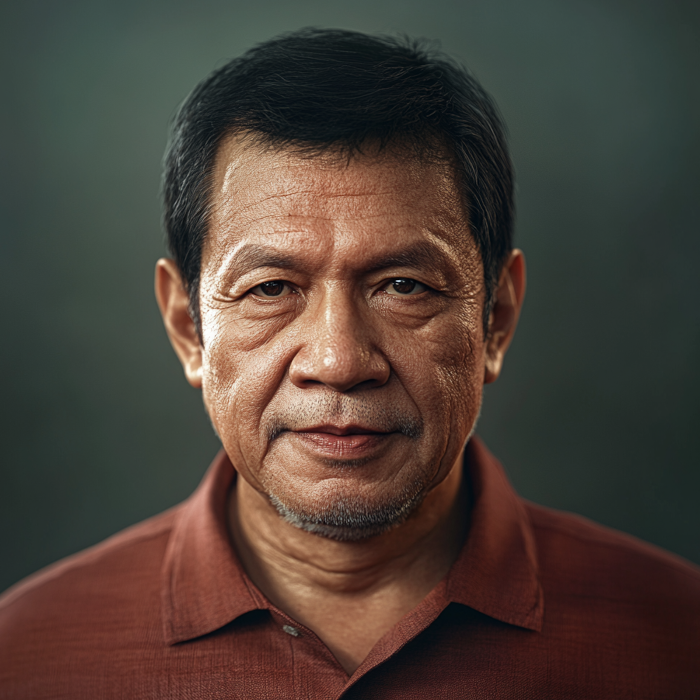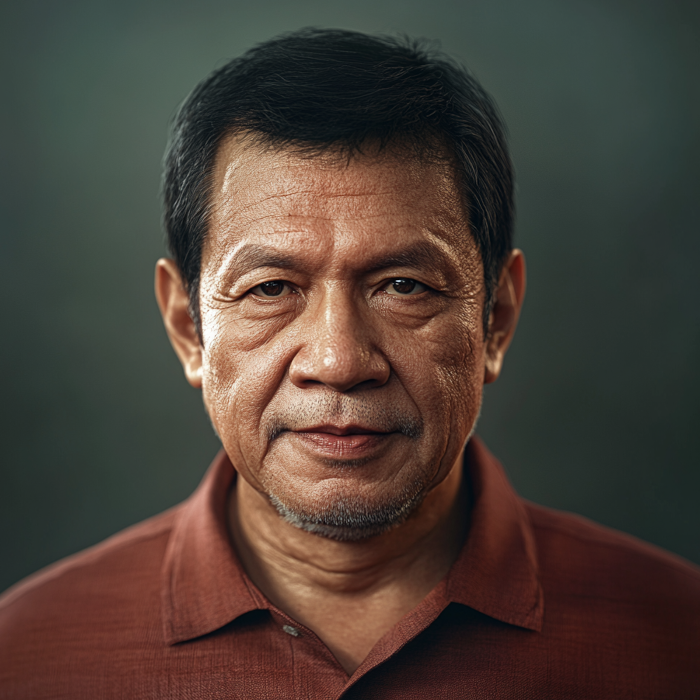


Rodrigo Roa Duterte (born 1945) is a Filipino politician and lawyer who served as the 16th President of the Philippines from 2016 to 2022. Known for his tough stance on crime, corruption, and drugs, Duterte gained international attention for his controversial rhetoric and "war on drugs" policy, which resulted in widespread criticism from human rights organizations. Before his presidency, Duterte was a long-serving Mayor of Davao City, where he was credited for turning the city into one of the safest in the country, albeit through heavy-handed methods. Duterte’s leadership style was marked by populism, nationalism, and often profane language, and his presidency left a significant impact on Philippine politics and society.
Birth and Family Background: Rodrigo Duterte was born on March 28, 1945, in Maasin, Southern Leyte, Philippines. He comes from a prominent political family. His father, Vicente Duterte, was a former governor of the now-defunct Davao Province, and his mother, Soledad Roa Duterte, was a school teacher and a civic leader known for her activism against the Marcos dictatorship. The family moved to Davao City when Rodrigo was young, and he spent most of his childhood in the city.
Education and Legal Career: Duterte attended Ateneo de Davao University for his high school education, though he was expelled from multiple schools during his youth for unruly behavior. He later earned a degree in Political Science from Lyceum of the Philippines University in Manila and completed his Bachelor of Laws at San Beda College. After passing the bar exam in 1972, Duterte worked as a prosecutor in Davao City, where he gained experience dealing with criminal cases, which would later influence his approach to crime and justice.
Mayor of Davao City: Duterte first entered politics in 1986 as the appointed Vice Mayor of Davao City after the People Power Revolution that ousted Ferdinand Marcos. In 1988, he was elected as the Mayor of Davao City, a position he held for over 22 years across multiple terms (1988–1998, 2001–2010, 2013–2016). Duterte was also known as the "Punisher" due to his strict and often extrajudicial approach to combating crime, particularly drug trafficking and organized crime.
Transformation of Davao City: Under Duterte's leadership, Davao City transformed from a crime-ridden area to one of the safest cities in the Philippines. He imposed strict laws, such as curfews for minors, smoking bans in public places, and alcohol bans after certain hours. Duterte's leadership was credited with reducing crime rates in Davao, and he was widely popular among Davao residents. However, his tenure was marred by allegations of human rights abuses, and he was accused of supporting or turning a blind eye to the activities of the Davao Death Squad (DDS), a vigilante group reportedly responsible for the extrajudicial killings of suspected criminals.
Populist Campaign: Duterte announced his candidacy for the 2016 Philippine presidential election late in the campaign season, in November 2015. Running under the platform of law and order, Duterte promised to eradicate crime and drugs within six months of taking office. His campaign focused on issues such as corruption, poverty, federalism, and the failure of the political elite to address the needs of the common people. His blunt, unfiltered speech and promises to take extreme measures against criminals resonated with many Filipinos who were frustrated with rising crime and government inefficiency.
Electoral Victory: Duterte won the May 2016 election by a wide margin, securing about 39% of the vote against four other major candidates. His victory was seen as a rejection of the political establishment, and he became the oldest person to be elected President of the Philippines at 71 years old. Duterte was inaugurated on June 30, 2016.
War on Drugs: The centerpiece of Duterte's presidency was his war on drugs. He launched an aggressive nationwide anti-drug campaign, calling on both law enforcement and citizens to target drug users and traffickers. The campaign resulted in thousands of deaths, with estimates ranging from 6,000 to over 30,000 people killed, including alleged extrajudicial executions. Duterte defended his actions as necessary to protect law-abiding citizens from the dangers of illegal drugs. However, the anti-drug campaign drew sharp criticism from human rights organizations, the United Nations, and various foreign governments, who condemned the extrajudicial killings and lack of due process.
Anti-Corruption and Crime: Duterte also pledged to fight corruption and government inefficiency. He implemented measures to reduce bureaucratic red tape and went after allegedly corrupt government officials. However, critics argued that his anti-corruption campaign was selective, often targeting political opponents while sparing allies. During his presidency, he also signed laws to increase the salaries of uniformed personnel, including the military and police, which helped maintain their loyalty.
Foreign Policy Shift: Duterte pursued an independent foreign policy, seeking to reduce the Philippines' reliance on the United States while fostering closer ties with China and Russia. He announced a "separation" from the United States early in his term, criticizing American interference in Philippine affairs and shifting his focus to building economic and diplomatic relationships with China. Despite his harsh rhetoric towards the U.S., the Philippines maintained its security alliance with the country, including military exercises. Duterte's warming ties with China, particularly amid ongoing territorial disputes in the South China Sea, raised concerns about compromising Philippine sovereignty.
Relations with China and the South China Sea: Duterte took a more conciliatory approach towards China in the South China Sea dispute, setting aside the 2016 Permanent Court of Arbitration ruling that favored the Philippines. Instead, he sought Chinese investments and loans, arguing that a confrontational approach would not benefit the country. Critics accused Duterte of being too accommodating to China and compromising the Philippines' territorial integrity. Despite his stance, Duterte occasionally asserted Philippine sovereignty in the South China Sea but avoided escalating tensions.
Economic Initiatives and Infrastructure: Duterte’s administration launched an ambitious infrastructure development program called "Build, Build, Build", which aimed to modernize the country’s infrastructure through the construction of roads, bridges, airports, and other projects. The initiative was intended to boost economic growth, create jobs, and attract foreign investment. Despite delays and challenges, the program led to significant infrastructure improvements during his term. The economy grew steadily in the early years of his presidency, but the COVID-19 pandemic in 2020 led to a severe economic contraction, and the government had to focus on pandemic response and recovery.
Pandemic Response: Duterte’s administration faced criticism for its handling of the COVID-19 pandemic. The country experienced extended lockdowns, high infection rates, and logistical challenges in vaccine distribution. While the government eventually ramped up its vaccination campaign, critics pointed to inadequate healthcare capacity, inconsistent policies, and a heavy-handed enforcement of lockdown measures that led to human rights abuses. Duterte’s pandemic response was marked by strong rhetoric, including threats against individuals refusing to follow health protocols.
Anti-Terrorism Law and Press Freedom: In 2020, Duterte signed the controversial Anti-Terrorism Act, which expanded the definition of terrorism and granted broad powers to the authorities. Critics feared that the law could be used to suppress dissent and target activists and opposition figures. Duterte's administration was also accused of curtailing press freedom. The government’s decision not to renew the broadcasting franchise of ABS-CBN, the country’s largest media network, and the legal cases against prominent journalist Maria Ressa were seen as part of a broader effort to silence criticism.
Succession and Duterte’s Legacy: Duterte’s six-year term ended in June 2022, as the Philippine constitution limits presidents to a single term. He was succeeded by Ferdinand "Bongbong" Marcos Jr., the son of former dictator Ferdinand Marcos, who won the 2022 presidential election in a landslide. Duterte’s daughter, Sara Duterte-Carpio, also played a key role in the 2022 election, becoming the Vice President of the Philippines. Duterte himself remained popular until the end of his presidency, especially among poorer Filipinos who appreciated his tough stance on crime and his focus on infrastructure and social welfare programs.
Criticism and Controversy: Duterte's presidency was marked by significant controversy, particularly due to the human rights abuses associated with the war on drugs. Human rights organizations, including Amnesty International and Human Rights Watch, condemned the extrajudicial killings and the climate of fear created by his anti-drug campaign. In 2021, the International Criminal Court (ICC) opened an investigation into the alleged crimes against humanity committed during Duterte's anti-drug war. Duterte dismissed the investigation, insisting that the ICC had no jurisdiction over the Philippines, which had withdrawn from the ICC in 2019.
Impact on Democracy and Institutions: Duterte’s presidency had a significant impact on the state of democracy and institutions in the Philippines. Critics argued that his administration weakened democratic institutions, undermined the rule of law, and fostered a culture of impunity. His attacks on the media, the judiciary, and political opponents led to concerns about shrinking democratic space and the erosion of checks and balances. However, Duterte's supporters viewed his unorthodox approach as necessary to address the country’s long-standing issues of corruption, crime, and inequality.
Populist Leadership Style: Duterte’s leadership style was characterized by populism, often using colorful and profane language to connect with the common people. He portrayed himself as a man of the people, unafraid to challenge the political elite and take drastic measures for the benefit of the public. His straightforward and tough-talking approach won him a strong following among Filipinos disillusioned with traditional politicians. Despite the controversies, Duterte remained popular throughout his presidency, with many Filipinos appreciating his efforts to address crime and corruption.
Rodrigo Duterte was a highly polarizing figure in Philippine politics, whose presidency left a profound impact on the country’s political landscape. His tough-on-crime stance, exemplified by his controversial war on drugs, drew both praise and condemnation, making him a divisive leader domestically and internationally. Duterte’s approach to governance was characterized by populism, a nationalistic rhetoric, and a heavy reliance on strongman tactics, which resonated with many Filipinos seeking change.
While Duterte's administration achieved significant infrastructure development and maintained popularity among the masses, his record on human rights, press freedom, and democratic governance was heavily criticized. His presidency exposed the deep divides within Philippine society, particularly regarding the balance between security and human rights. As Duterte exited office, his legacy continued to shape the national discourse, with debates over the merits and consequences of his policies likely to endure for years to come.

We use cookies
We use cookies and other tracking technologies to improve your browsing experience on our website, to show you personalized content and targeted ads, to analyze our website traffic, and to understand where our visitors are coming from. Privacy Policy.